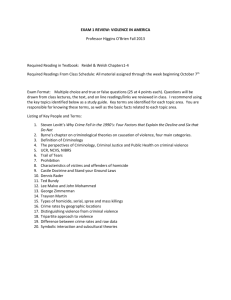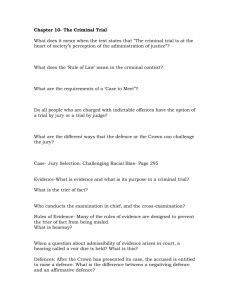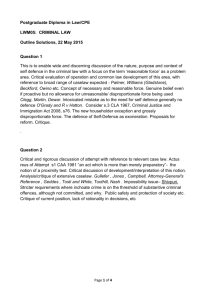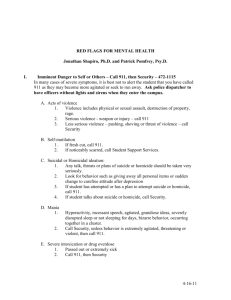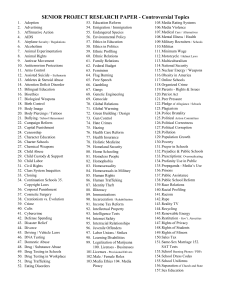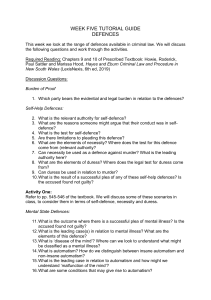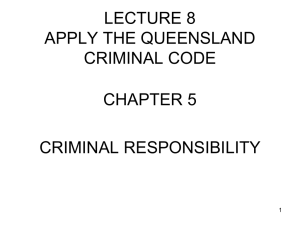What do you need to do? The following is just a suggested approach
advertisement
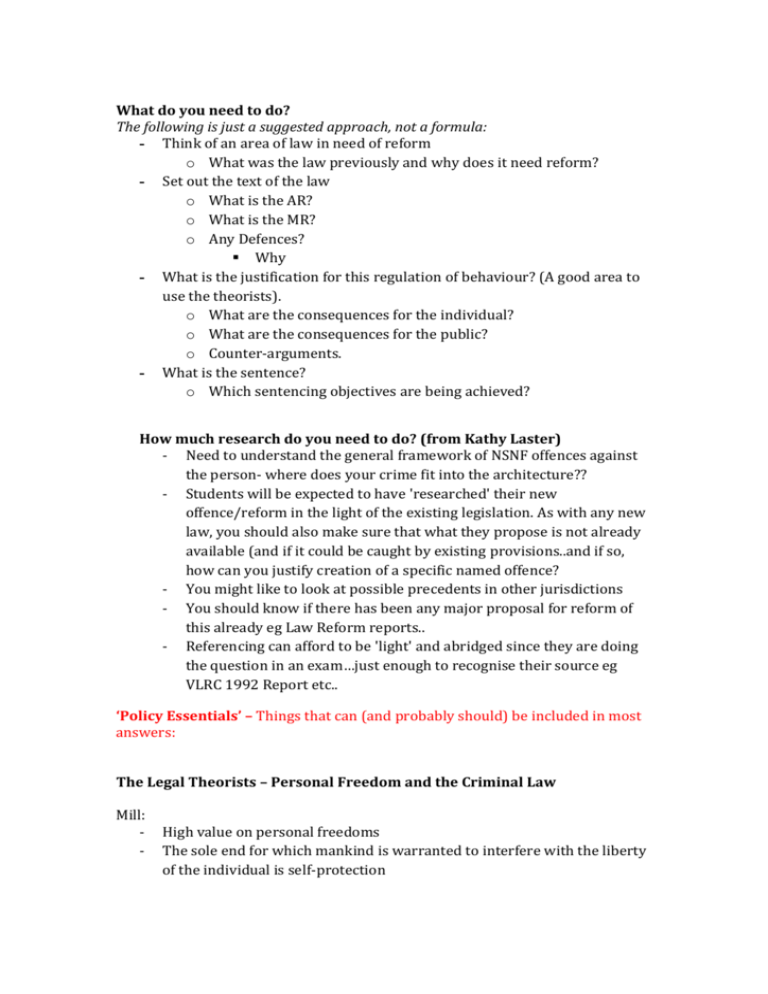
What do you need to do? The following is just a suggested approach, not a formula: - Think of an area of law in need of reform o What was the law previously and why does it need reform? - Set out the text of the law o What is the AR? o What is the MR? o Any Defences? Why - What is the justification for this regulation of behaviour? (A good area to use the theorists). o What are the consequences for the individual? o What are the consequences for the public? o Counter-arguments. - What is the sentence? o Which sentencing objectives are being achieved? How much research do you need to do? (from Kathy Laster) - Need to understand the general framework of NSNF offences against the person- where does your crime fit into the architecture?? - Students will be expected to have 'researched' their new offence/reform in the light of the existing legislation. As with any new law, you should also make sure that what they propose is not already available (and if it could be caught by existing provisions..and if so, how can you justify creation of a specific named offence? - You might like to look at possible precedents in other jurisdictions - You should know if there has been any major proposal for reform of this already eg Law Reform reports.. - Referencing can afford to be 'light' and abridged since they are doing the question in an exam…just enough to recognise their source eg VLRC 1992 Report etc.. ‘Policy Essentials’ – Things that can (and probably should) be included in most answers: The Legal Theorists – Personal Freedom and the Criminal Law Mill: - High value on personal freedoms The sole end for which mankind is warranted to interfere with the liberty of the individual is self-protection - The criminal law is a blunt tool and it should only be invoked as a last resort Devlin: - The law exists for a higher purpose than the protection of the individual: it exists for the purpose of maintaining certain standards of moral behaviour which society requires to be observed - The moral integrity of society must be maintained – what is ‘moral’ will be ascertained by the standard of the reasonable person Hart: - Paternalism – protecting individuals from themselves - People do not always know what is best for them – the laws must regulate this R v Brown: On the interests of the individual vs. the interests of the community: - Lord Mustill: The state should interfere with the rights of an individual to live life as he or she may choose no more than is necessary to ensure a proper balance between the special interests of the individual and the general interests of the populace at large - The majority – placed great emphasis on the protection of the public interest S 5(1) of the Sentencing Act Here you will find some good guidance on the purposes of the criminal law: - Just Punishment (Retribution) - Deterrence (specific and general) - Rehabilitation - Denunciation - Protection of the Community Mental States Objective vs. Subjective - Why do we need objective tests? o To test the D’s subjective beliefs against the values and standards of the community o What about morally obtuse people, should they get to escape liability? o Which theorists would agree? - What are the benefits of subjective tests? o Dealing with the criminal law and the right to liberty o When might a party not act reasonably? Self-Defence (Royall’s case), Familiy violence Policy Topics – possible areas of the law in which you could base your crime: The following are just some general suggestions about current policy issues in the current criminal law. They are a starting point only and have been compiled to give you an idea about what areas you might choose to change by creation of your new law. Feel free to consider these issues, but you must do so with regard to the actual task you have been asked to complete in mind. Consent as a Defence: Law: Inability to consent to the actual infliction of injury R v Brown Current exceptions: o Exceptions in relation to surgical procedures, personal adornment (tattooing and branding), cosmetic procedures o Sporting activities including boxing What about the application of force that is not ordinarily and reasonably incidental to the sport? How do you determine what is ‘incidental’ Pallante Stadiums o Self determination as to medical procedures o Parent consent on the behalf of children Male and Female circumcision Should any of the exceptions become criminalized? Is there any behaviour that is currently criminalized to which the defence of consent should operate? See R v Brown Reasonable Chastisement of Children Current law: - See R v Terry - See also R v Jackson - See also s61AA of the Crimes Amendment Act ‘the force must be reasonable hacing regard to the age, health, maturity or other characteristics of the child.’ How do we determine these standards What are the problems with the current law? Eg: - Studies show that the home is the most common context in which acts of serious violence occur - Cultural ideas that the act of violence by a man on members of his family are not the business of the law - What is ‘reasonable.’ Possible sources to consider: - See the UN convention on the Rights of the Child - S 10 of the Victorian Charter of Human Rights and Responsibilities Act Self-defence and Family Violence + The introduction of defensive homicide (note this does not relate to non-fatal non-sexual offences against the person – but perhaps some of these policy issues could be applied to NFNS offenes against the person?? Good also for general knowledge and possible application in the substantive exam) - Why did the government change the law of self-defence to include family violence? - What are the changes: introduction of 9AD (defensive homicide) and the factors under 9AH(3) What are the good things about it? o Particularly in relation to how allows the court to investigate the issues associated with family violence and battered womens’ syndrome? o Changing the way people view domestic violence o Introducing penalties for behaviour that occurs ‘in the home’ and was often left ‘in the home.’ What are some negative things? - Do you think that the changes to the law make it too easy for women to murder their abusive husbands? Are we authorising or encouraging homicide without requiring women to attempt to leave the situation first? - Would it be more appropriate to have a defence under mental impairment – since we are looking at the psychology of the defendant? Some key cases to consider: o Middendorp – the case where the defendant killed his girlfriend in the back by stabbing her multiple times. He claimed that he believed that he was defending himself. The jury believed that he did hold this belief (although unreasonably). He successfully availed himself of the defence of defensive homicide. Is this case consistent with the purposes of the introduction of defensive homicide? Is further reform needed? o Osland’s case If she had been tried under the new regime, do you think the result would have been different? o Macdonald’s case This case was just before the introduction of the new regime but it was at the forefront of the judge’s mind. Would the result have been different after the introduction of the new regime? The abolition of provocation - Who was it most commonly used by? Violent men as an excuse for anger an jealousy. - What sort of message did it send to society? - Could it be reformed and reintroduced to be more applicable to modern society? - Who could use the defence today if it were introduced? Intoxication Current law: - Under the common law (O’connor) consent does not operate as a defence - Under s 9AJ (1) whenever the standard is reasonableness – then the test is of the reasonable person who is not intoxicated. Unless the person’s intoxication is not self-induced. - Intoxication can apply to issues of voluntariness – in some cases where there is ‘gross intoxication’ a person’s actions cannot be considered to be consciously willed. Proposed changes: - Should the law be changed to create a defence of intoxication? - Should the law be changed to prevent intoxication from being used to prevent AR from being established? See Barwick CJ in R v O’Connor - Should there be a new law criminalizing certain types of intoxication? Issues: - If a person allows himself/herself to become drunk then should he/she be allowed to escape liability? - Protection of the community? - Rights of the individual? - Consider O’connor; Majewiski Exam Tips: Preparation: - Prepare your notes as early as you can so that you can do as many practice exams as you can. - Make sure you correct your exam - I find it useful to start by summarising the cases (including the facts) and then placing the main principles from the case in my summary notes, which are the notes I use to attack the problem. - Try doing exams to time – and calculate your time to be spent on each question (according to number of marks assigned) before you go into the exam room. During the exam: - Use your reading time effectively – read the facts carefully, and read the question carefully. Make sure you have a clear idea in mind as to whom you have to advise. - Plan your answer: spot the crime, and spot potential areas of difficulty and plan your ‘sequence’ of answer. - In answering each question make sure you not only state the principle, but apply it to the facts. Always try to argue in the alternative and conclude (using policy if it helps you to get an answer one way or the other). - Stick to your time limits.
